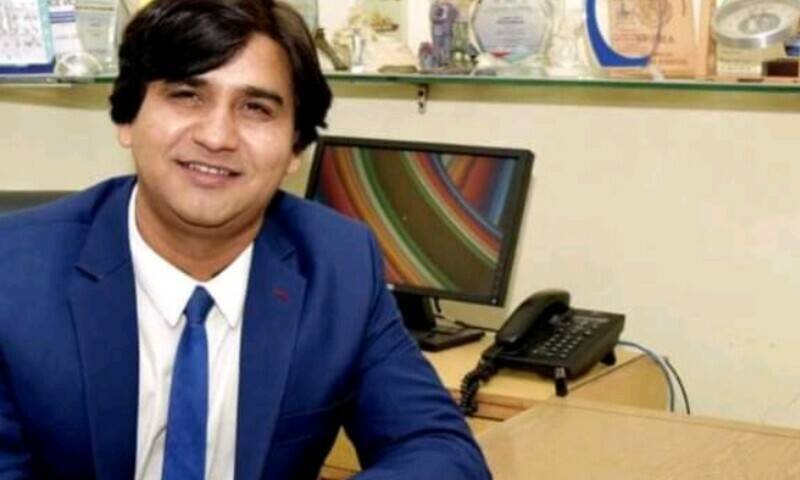
A Senate panel on Friday expressed concerns over the ability of the local police to enforce state writ in the Sindh district of Kashmore.
This was expressed by senators during a meeting of the Senate Standing Committee on Human Rights which met at the Parliament House on Friday. Senator Walid Iqbal of the Pakistan Tehreek-e-Insaf (PTI) chaired the meeting.
The committee took up the murder of Professor Ajmal Sawand in Kandhkot, Sindh. Prof Sawand, who had completed his doctorate in computer science from France, was killed when members of the rival Sundrani tribesmen allegedly fired at this car near the Ghora Ghat police station in Kandhkot.
Prof Sawand owned some land in the riverine area near Kandhkot, and after inspecting them, he was returning to his village in Shalu Khan when he was attacked.
During the panel's meeting on Friday, Kashmore Senior Superintendent of Police (SSP) Ifran Ali Samo stated that Prof Sawand had been murdered due to an enmity between the Sawand and Sundrani tribes. A member of the Sundrani tribe had been killed in the area visited by Sawand. And since the Sundranis believed that their tribesman was killed by a Sawand over a five-year-old honour killing dispute, they targeted Prof Sawand as revenge.
READ MORE: Fact-Finding Mission Arrives In Ghouspur After Attack on Hindu Temple
SSP Samo said that since the last meeting of the committee on June 7, they had twice attempted to raid suspected hideouts of the attackers - Aijaz Ali Sundrani and his nine accomplices - in the forest within the riverine area.
However, despite using armoured personnel carriers, they were unable to make any headway due to the heavy armament used by the suspects, including rocket launchers and mortars, among other sophisticated weapons that the police could not match up against.
Moreover, SSP Samo said that the situation had grown more complex since another member of the Sundrani tribe was allegedly killed by the Sawand tribe, fueling tensions.
At this, committee members expressed concerns over the state's writ being enforced in the region.
READ MORE: More Than 30 Hindus Held Hostage By Bandits In Sindh
They unanimously recommended that the Sindh government equip the provincial police department with the weaponry necessary to counter this threat.
Secondly, they recommended that all resources of the state should be availed to overcome and arrest the miscreants, including the use of paramilitary and regular military.
Thirdly, senators recommended that sincere attempts should be made to get the Sawand-Sundrani tribes to amicably resolve the feud to bring the blood-letting to an end.
Further, the committee unanimously recommended that the ministries of interior and defence should be asked to take necessary action in this regard.
The Sindh police were directed to submit a progress report within one month.
The meeting was attended by Senators Professor Dr Mehr Taj Roghani, Senator Dr Muhammad Humayun Mohmand, Secretary for Ministry of Human Rights Ali Raza Bhutta, Kashmore SSP Irfan Ali Samo, and other senior officers of relevant departments.
This was expressed by senators during a meeting of the Senate Standing Committee on Human Rights which met at the Parliament House on Friday. Senator Walid Iqbal of the Pakistan Tehreek-e-Insaf (PTI) chaired the meeting.
The committee took up the murder of Professor Ajmal Sawand in Kandhkot, Sindh. Prof Sawand, who had completed his doctorate in computer science from France, was killed when members of the rival Sundrani tribesmen allegedly fired at this car near the Ghora Ghat police station in Kandhkot.
Prof Sawand owned some land in the riverine area near Kandhkot, and after inspecting them, he was returning to his village in Shalu Khan when he was attacked.
During the panel's meeting on Friday, Kashmore Senior Superintendent of Police (SSP) Ifran Ali Samo stated that Prof Sawand had been murdered due to an enmity between the Sawand and Sundrani tribes. A member of the Sundrani tribe had been killed in the area visited by Sawand. And since the Sundranis believed that their tribesman was killed by a Sawand over a five-year-old honour killing dispute, they targeted Prof Sawand as revenge.
READ MORE: Fact-Finding Mission Arrives In Ghouspur After Attack on Hindu Temple
SSP Samo said that since the last meeting of the committee on June 7, they had twice attempted to raid suspected hideouts of the attackers - Aijaz Ali Sundrani and his nine accomplices - in the forest within the riverine area.
However, despite using armoured personnel carriers, they were unable to make any headway due to the heavy armament used by the suspects, including rocket launchers and mortars, among other sophisticated weapons that the police could not match up against.
Moreover, SSP Samo said that the situation had grown more complex since another member of the Sundrani tribe was allegedly killed by the Sawand tribe, fueling tensions.
At this, committee members expressed concerns over the state's writ being enforced in the region.
READ MORE: More Than 30 Hindus Held Hostage By Bandits In Sindh
They unanimously recommended that the Sindh government equip the provincial police department with the weaponry necessary to counter this threat.
Secondly, they recommended that all resources of the state should be availed to overcome and arrest the miscreants, including the use of paramilitary and regular military.
Thirdly, senators recommended that sincere attempts should be made to get the Sawand-Sundrani tribes to amicably resolve the feud to bring the blood-letting to an end.
Further, the committee unanimously recommended that the ministries of interior and defence should be asked to take necessary action in this regard.
The Sindh police were directed to submit a progress report within one month.
The meeting was attended by Senators Professor Dr Mehr Taj Roghani, Senator Dr Muhammad Humayun Mohmand, Secretary for Ministry of Human Rights Ali Raza Bhutta, Kashmore SSP Irfan Ali Samo, and other senior officers of relevant departments.

